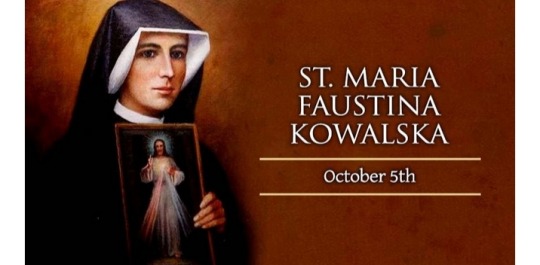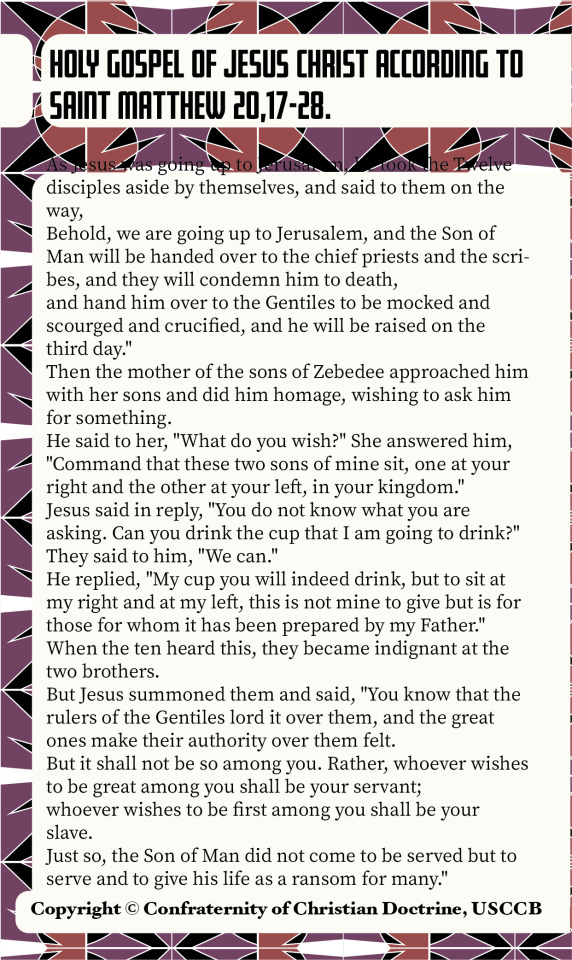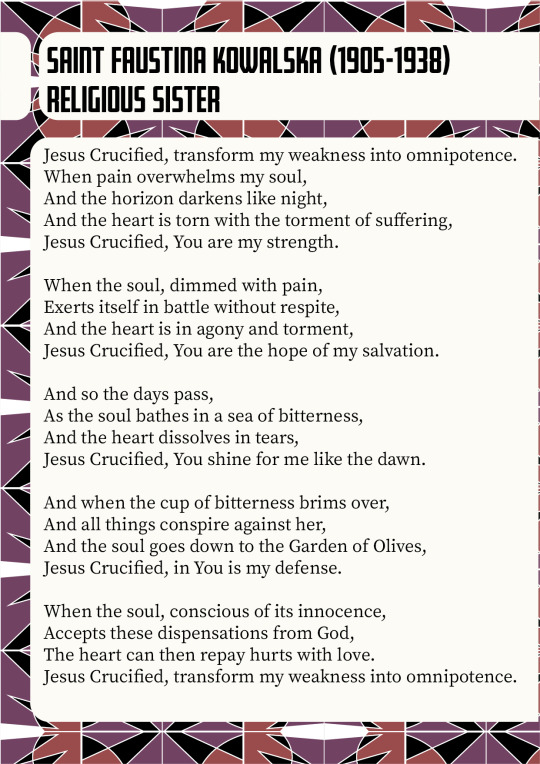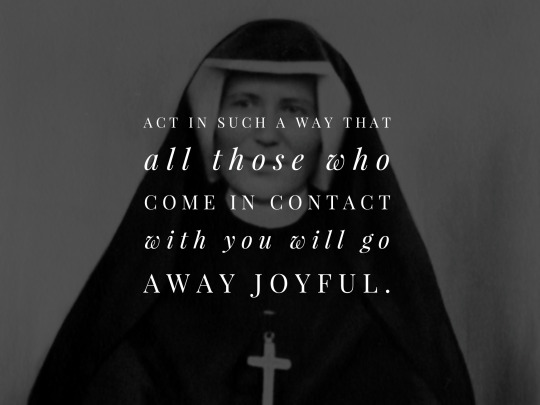#Saint Faustina Kowalska
Text

The Image of the Divine Mercy - Jesus, I trust in You (1943) by Adolf Hyła (Polish, 1897–1965)
The image of the Divine Mercy is a depiction of Jesus Christ that is based on the devotion initiated by Saint Faustina Kowalska.
Adolf Hyła painted this version of the Divine Mercy for the Congregation of the Sisters of Our Lady of Mercy in Kraków, as a votive offering in gratitude for the safety of his family during World War II.
#divine mercy#adolf hyła#polish art#catholic art#poland#saint faustina#saint faustina kowalska#faustyna kowalska#jesus christ#catholic#christian faith#christianity#christian#catholicism#roman catholic#catholic church#roman catholicism#adolf hyla#ww2#painting#wwii#*
141 notes
·
View notes
Text

Made with pencil colors at October 10 of 2022
2 notes
·
View notes
Photo

“I must strive to make the interior of my soul a resting place for the Heart of Jesus.”
~St. Maria Faustina Kowalska
#Virgin Mary#Lord Jesus#Madonna and Christ Child#saints#st. maria faustina kowalska#Christian art#Sculpture#churches#my soul a resting place for the heart of jesus#my hope and desire#Theotokos#Panagia
469 notes
·
View notes
Text
SAINT OF THE DAY (October 5)

On October 5, the church celebrates the Memorial of St. Mary Faustina Kowalska, virgin.
St. Faustina was born Helena Kowalska on 25 August 1905 to a poor but devout Polish family in 1905.
At the age of 20, with very little education, and having been rejected from several other convents because of her poverty and lack of education, Helen entered the Congregation of the Sisters of Our Lady of Mercy.
There, she took the name Sr. Faustina and spent time in convents in both Poland and Lithuania.
Throughout her life, Jesus appeared to Sr. Faustina.
He asked her to become an apostle and secretary of his mercy by writing down his messages of Divine Mercy for the world in her diary.
Jesus also asked Sr. Faustina to have an image painted of his Divine Mercy, with red and white rays issuing from his heart, and to spread devotion to the Divine Mercy novena.
Even before her death on 5 October 1938, devotion to Divine Mercy began to spread throughout Poland.
This little nun and Jesus’ message of Divine Mercy impacted Karol Wojtyla greatly, which became obvious to the world when he was elected pope.
“It is truly marvelous how her devotion to the merciful Jesus is spreading in our contemporary world and gaining so many human hearts!
This is doubtlessly a sign of the times — a sign of our twentieth century.
The balance of this century, which is now ending, in addition to the advances which have often surpassed those of preceding eras, presents a deep restlessness and fear of the future.
Where, if not in the Divine Mercy, can the world find refuge and the light of hope? Believers understand that perfectly,” Pope St. John Paul II wrote.
On 30 April 2000, Pope John Paul II canonized St. Faustina in what he was widely reported as saying was “the happiest day of my life.”
“Today, my joy is truly great in presenting the life and witness of Sr. Faustina Kowalska to the whole Church as a gift of God for our time.
By divine Providence, the life of this humble daughter of Poland was completely linked with the history of the 20th century, the century we have just left behind.
In fact, it was between the First and Second World Wars that Christ entrusted his message of mercy to her.
Those who remember, who were witnesses and participants in the events of those years and the horrible sufferings they caused for millions of people, know well how necessary was the message of mercy,” the Pope said in his homily that day.
It was also on this day, the Sunday after Easter, that Pope John Paul II instituted the Feast of Divine Mercy, which Jesus had asked for in his messages to Sr. Faustina.
#Saint of the Day#St. Mary Faustina Kowalska#Helena Kowalska#Divine Mercy#Pope St. John Paul II#Feast of Divine Mercy
9 notes
·
View notes
Text


About St Bernadette (left)
About St Faustina (right)
Modern Saints Round 2 Winners/Round 3 Bracket
#st bernadette soubirous#st faustina kowalska#catholic saint tournament#tumblr polls#theology#tumblr tournament#tumblr bracket#polls#christianity#catholic saints#catholicism#catholic
8 notes
·
View notes
Text
2023 JULY 19 Wednesday
"To converse with You, O Lord, is the delight of my heart. My Lord and Creator, Your goodness encourages me to converse with You. Your mercy abolishes the chasm which separates the Creator from the creature.
For this incomprehensible goodness of Yours, I adore You, O Lord and Creator, with all my heart and all my soul. And, although my worship is so little and poor, I am at peace because I know that You know it is sincere, however inadequate."
~ Saint Faustina Kowalska, Diary of St Faustina °1692
#bible#gospel#further reading#Saint#Faustina Kowalska#Diary of St. Faustina#1692#converse#God#Lord#Jesus#Christ#delight#heart#creator#goodness#encourage#mercy#abolish#chasm#between#creature#soul#worship#peace#sincere
6 notes
·
View notes
Text

THE DESCRIPTION OF SAINT FAUSTINA KOWALSKA
The Apostle of the Divine Mercy
Feast Day: October 5
"Love endures everything. Love is stronger than death. Love fears nothing."
Saint Faustina is 'a gift from God for our times', great mystic, mistress of spiritual life, prophet, who reminded the biblical truth about merciful love of God for every human being and calls to proclaim it to the world through the testimony of life, deed, word and prayer.
Apostle of Divine Mercy, Prophet of Our Times, Great Mystic, Mistress of Spiritual Life – these are the epithets usually appended to the name of Sister Faustyna Kowalska, St. Faustyna (Faustina), of the Congregation of the Sisters of Our Lady of Mercy. Sister Faustina is one of the Church’s most popular and widely known saints and the greatest mystics in the history of the Church.
Sister Faustina was born on August 25, 1905 in Głogowiec, Poland to Marianna and Stanisław Kowalski as the third of ten children. Two days later she was baptized with the name Helena in the parish church of Świnice Warckie. At the age of nine, she made her first Holy Communion. She attended elementary school for merely three years and then she went to work as a housekeeper in various well–to–do families in Aleksandrów and Łódź. From the age of seven, she had felt the calling for religious vocation, but her parents would not give her permission to enter the convent. However, impelled by the vision of the Suffering Christ, in July 1924 she left for Warsaw to find a place. For another year she worked as a housekeeper to save some money for a modest monastic trousseau. On August 1, 1925, she entered the Congregation of the Sisters of Our Lady of Mercy in Warsaw on Żytnia St.
She lived in the Congregation for thirteen years, staying in many houses, the longest time (she spent) in Kraków, Płock and Vilnius; working as a cook, shop assistant in baker's shop, gardener, and portress. She suffered from tuberculosis of the lungs and alimentary system and that is why for over 8 months stayed at the hospital in Kraków – Prądnik. Greater sufferings from those which were caused by tuberculosis, she offered as a voluntary sacrifice for sinners and as the Apostle of Divine Mercy. She experienced also many extraordinary graces such as: apparitions, ecstasies, the gift of bilocation, hidden stigmata, reading into human souls, the mystical betrothal and nuptials.
Sister Faustina's principal task was to pass on to the Church and world the Message of Mercy, a recapitulation of the Biblical truth of God's Merciful Love for every human being, and a calling to each of us to entrust our lives to Him and to actively love our neighbour. Jesus not only revealed the depth of His Mercy to St. Faustina, but also gave her new forms of worship: the picture inscribed, 'Jesus, I trust in You, the Feast of Divine Mercy, the Chaplet of Divine Mercy, and the Prayer in the Hour of His Death on the Cross, the Hour of Mercy.' To each of these forms of worship, as well as to the preaching of the message of Mercy, He attached great promises, on condition that we care about the attitude of trust in God that is to fulfill His will and show mercy to our neighbours.
Sister Faustina died in Krakow on October 5, 1938, at the age of just thirty–three. Out of her charism and mystical experience grew the Apostolic Movement of the Divine Mercy which continues her mission, proclaiming the message of Mercy to the world through the testimony of life, deed, words and prayer. On April 18, 1993, the Holy Father John Paul II raised her to the glory of the altars and on April 30, 2000, numbered her among the saints of the Church. Her relics are in the Shrine of the Divine Mercy at Łagiewniki, Kraków.
The Holy Father John Paul II wrote that in the age of totalitarianisms Sister Faustina became the ambassador of the message that the only power strong enough to counteract their evil is the truth of God's Mercy. He called her Diary a Gospel of Mercy written from a 20th-century perspective, which has helped people to survive the extremely painful experiences of these times.
This message, Pope Benedict XVI has said: 'The message of Mercy as the Divine Power, as God putting a check on all the world’s evil, is indeed the chief message of our times.'
Source: The Sisters of Our Lady of Mercy (Lakeville, MA)
3 notes
·
View notes
Text
listen. i don't want to hate on religion but wdym jesus told you to join his church. wdym he told you how to live and you obeyed. wdym.
#scary stuff#if jesus ever spoke in MY head i would NOT be this calm#shoutout to my girl faustina kowalska but. come on. wdym you became a saint because jesus was speaking to you#the thought of people hearing a voice in their head and thinking its god is. is so scary to me#bro little me would have NOT coped with it well i already know you dont have to say it
1 note
·
View note
Photo




Readings for 8 MARCH
8/3/2023
#Book of Jeremiah 18#Book of Jeremiah#Psalms 31(30)#Psalms#Holy Gospel of Jesus Christ according to Saint Matthew 20#Holy Gospel of Jesus Christ according to Saint Matthew#Saint Faustina Kowalska (1905-1938)#Jesus Crucified transform my weakness into omnipotence.#God#Lord#Jesus#Holy Spirit#love#hope#heaven
1 note
·
View note
Text
“My daughter, do not omit Holy Communion unless you know well that your fall was serious; apart from this, no doubt must stop you from uniting yourself with Me in the mystery of My love. Your minor faults will disappear in My love like a piece of straw thrown into a great furnace. Know that you grieve Me much when you fail to receive Me in Holy Communion.” Jesus to Saint Faustina Kowalska
259 notes
·
View notes
Text
Catholicism Masterlist
NOTE:::: Items highlighted in red are my favorites for learning Catholicism.
Books for Learning Catholicism:
The Word on Fire Bible
Catechism of the Catholic Church second edition (pdf here)
Catholic Faith Handbook For Youth by Brian Singer-Towns and other contributors (pdf here)
Books About Prayer:
The Liturgy of the Hours by Word on Fire
The Secret of the Rosary by St. Louis de Montfort
The Rosary for the Holy Souls in Purgatory by Susan Tassone
10 Wonders of the Rosary by Fr. Donald Calloway, MIC
The Memorare Moment by Rev. Francis Joseph Hoffman
Blessed Sacrament Prayer Book edited by Bart Tesoriero
Heart of the Christian Life: Thoughts on Holy Mass by Pope Benedict XVI
Meet the Witnesses of the Miracle of the Sun by John M. Haffert
Our Father: Spiritual Reflections by Pope Francis
The Prayers & Personal Devotions of Mother Angelica, introduced & edited by Raymond Arroyo
Books About Saints:
Lives of the Saints: For Everyday in the Year by Fr. Alban Butler
Diary of Saint Maria Faustina Kowalska - Divine Mercy in My Soul by St. Maria Faustina Kowalska
Send Me Your Guardian Angel by Fr. Alessio Parente
Forty Dreams of St. John Bosco: From Saint John Bosco's Biographical Memoirs by St. John Bosco
Saint Charbel by Paul Daher
Mornings With St. Thérèse by St. Thérèse Editor: Patricia Treece 
The Secret of Mary by St. Louis de Montfort
The Confession of St. Patrick by St. Patrick
Saint Rafqa the Lebanese Nun (1832-1914) Teacher of the Generations and Patron Saint of the Suffers Father Elias Hanna (L.M.O.)
Rediscover the Saints by Matthew Kelly
Other Books:
The Screwtape Letters by C.S. Lewis
7 Secrets of Confession by Vinny Flynn
Our Grounds for Hope by Archbishop Fulton Sheen
How to Share Your Faith by Bishop Robert Barron
How to Discern God’s Will for Your Life by Bishop Robert Barron
An Exorcist Tells His Story by Gabriele Amorth
This Is My Body by Bishop Robert Barron
Apps:
EWTN
Relevant Radio
Formed
iBreviary
CatholicTV
Mass Times for Travel
Websites:
EWTN
Relevant Radio
The Divine Mercy
Word on Fire
The United States Conference of Catholic Bishops (USCCB)
Some social media:
Bishop Robert Barron
Divine Mercy
Breaking in the Habit
Sensus Fidelium
EWTN
Sacred Music:
Harpa Dei
Floriani
Groups:
The Association of Marian Helpers
Rosary Confraternity
Brown Scapular
Adoration Sodality of the Most Blessed Sacrament
What really happens at a Catholic Mass, short film
— —- —— — —- —— — —- —— — —- ——
This is by no means a complete list because I keep reading more books and finding new resources as a pilgrim in this life. Maybe you’ll find something here to help you grow in faith. May God bless you abundantly.
126 notes
·
View notes
Text
Joyful

What do you tell people about your faith?
For a lot of us, the answer is not much of anything.
Maybe we’re around people where it’s not welcome. Maybe we just don’t think to.
Maybe we don’t want to be like the jerks online who use God as a weapon.
Whatever the reason, we don’t just really talk about it.
But that doesn’t mean we’re not telling people about our faith.
Without speaking a word, without even meaning to, you and I tell people volumes about our faith.
We tell them about our faith by how we interact with them.
We tell them what our faith means in practice – we tell them how God will treat them – by how we treat them.
There’s an easy way for us to know what we’re telling them. You and I can see it in what they carry away from us.
If you’ve ever been around a truly holy person. The sort of person whose peace and quiet joy you couldn’t avoid carrying with you when you parted? Then you know what I’m talking about.
The thing is, having people carry that away from you isn’t something that’s reserved for the saints.
It’s something that even you and I can do – because God has already filled us with the grace to do it.
How? St. Faustina Kowalska (today’s saint) gives us the roadmap,
“Act in such a way that all those who come in contact with you will go away joyful.
Sow happiness about you because you have received much from God; give, then, generously to others.
They should take leave of you with their hearts filled with joy, even if they have no more than touched the hem of your garment.”
Today’s Readings
#Faith#Tell people about Jesus#God#Jesus#Catholic#Christian#Church#Mercy#Joy#Joyful#St. Faustina#Grace#Moments Before Mass
63 notes
·
View notes
Text
"We expect to obtain everything promised us by Jesus in spite of all our wretchedness. For Jesus is our Hope: through His merciful Heart, as through an open gate, we pass through to Heaven."
Diary of Saint Maria Faustina Kowalska
9 notes
·
View notes
Text
Now, rest your head on my heart, and draw from it strength and power for these sufferings because you will find neither relief nor help nor comfort anywhere else.
Maria Faustina Kowalska, Diary of Saint Maria Faustina Kowalska: Divine Mercy in My Soul
14 notes
·
View notes
Text
SAINT OF THE DAY (October 5)

On October 5, the church celebrates the Memorial of St. Mary Faustina Kowalska, virgin.
St. Faustina was born Helena Kowalska on 25 August 1905 to a poor but devout Polish family in 1905.
At the age of 20, with very little education, and having been rejected from several other convents because of her poverty and lack of education, Helen entered the Congregation of the Sisters of Our Lady of Mercy.
There, she took the name Sr. Faustina and spent time in convents in both Poland and Lithuania.
Throughout her life, Jesus appeared to Sr. Faustina.
He asked her to become an apostle and secretary of his mercy, by writing down his messages of Divine Mercy for the world in her diary.
Jesus also asked Sr. Faustina to have an image painted of his Divine Mercy, with red and white rays issuing from his heart, and to spread devotion to the Divine Mercy novena.
Even before her death on 5 October 1938, devotion to Divine Mercy began to spread throughout Poland.
This little nun and Jesus’ message of Divine Mercy impacted Karol Wojtyla greatly, which became obvious to the world when he was elected Pope.
“It is truly marvelous how her devotion to the merciful Jesus is spreading in our contemporary world and gaining so many human hearts! This is doubtlessly a sign of the times — a sign of our twentieth century.
The balance of this century, which is now ending, in addition to the advances which have often surpassed those of preceding eras, presents a deep restlessness and fear of the future.
Where, if not in the Divine Mercy, can the world find refuge and the light of hope? Believers understand that perfectly,” Pope St. John Paul II wrote.
On 30 April 2000, Pope John Paul II canonized St. Faustina in what he was widely reported as saying was “the happiest day of my life.”
“Today, my joy is truly great in presenting the life and witness of Sr. Faustina Kowalska to the whole Church as a gift of God for our time.
By divine Providence, the life of this humble daughter of Poland was completely linked with the history of the 20th century, the century we have just left behind.
In fact, it was between the First and Second World Wars that Christ entrusted his message of mercy to her. Those who remember, who were witnesses and participants in the events of those years and the horrible sufferings they caused for millions of people, know well how necessary was the message of mercy,” the Pope said in his homily that day.
It was also on this day, the Sunday after Easter, that Pope John Paul II instituted the Feast of Divine Mercy, which Jesus had asked for in his messages to Sr. Faustina.
#Saint of the Day#St. Mary Faustina Kowalska#Congregation of the Sisters of Our Lady of Mercy#Divine Mercy#Karol Wojtyla#Pope John Paul II#Feast of Divine Mercy
22 notes
·
View notes
Text


About St Faustina (left)
About St Katharine Drexel (right)
Modern Saints Round 1 Winners/Round 2 Bracket
#st faustina kowalska#st faustina#st katharine drexel#catholic saint tournament#polls#christianity#tumblr bracket#tumblr tournament#catholic saints#catholicism#catholic#theology#tumblr polls
7 notes
·
View notes